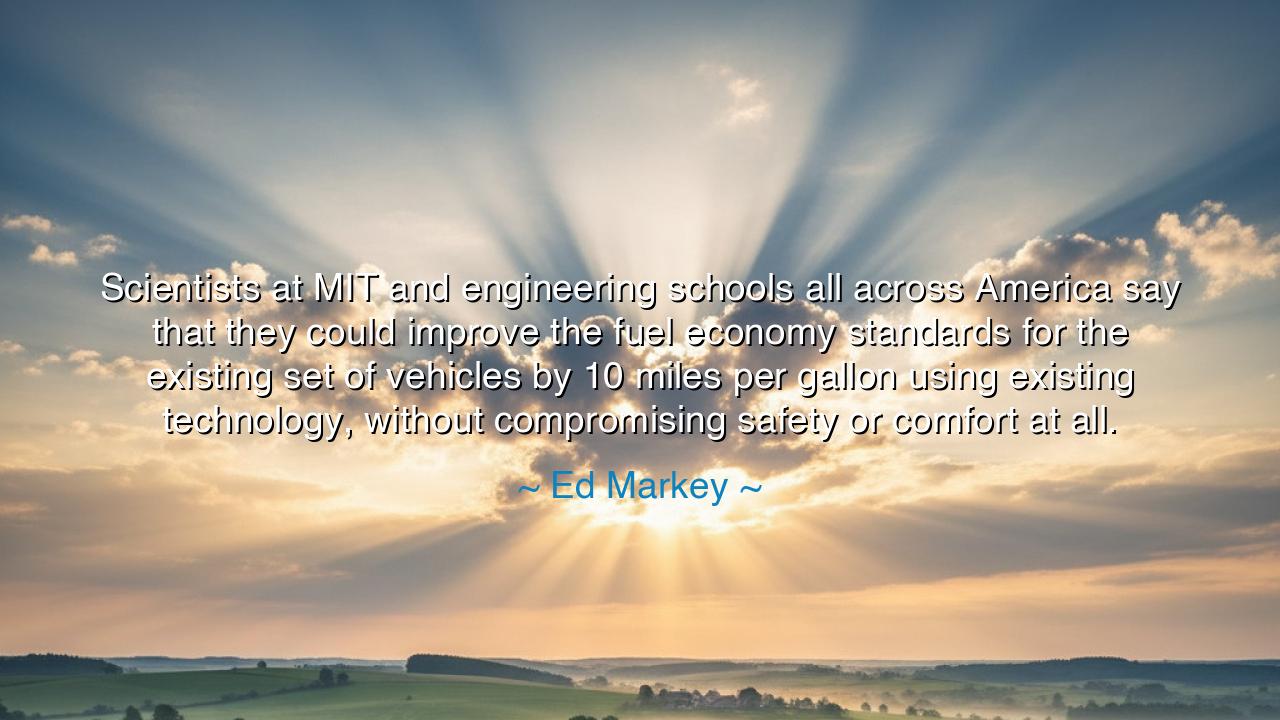
Scientists at MIT and engineering schools all across America say
Scientists at MIT and engineering schools all across America say that they could improve the fuel economy standards for the existing set of vehicles by 10 miles per gallon using existing technology, without compromising safety or comfort at all.






Hearken, O seekers of wisdom, to the declaration of Ed Markey, a voice of foresight in the halls of human endeavor: "Scientists at MIT and engineering schools all across America say that they could improve the fuel economy standards for the existing set of vehicles by 10 miles per gallon using existing technology, without compromising safety or comfort at all." Herein lies a revelation both urgent and noble: that the power to transform the ordinary, to harness existing knowledge for the common good, rests within reach, awaiting only the courage of decision and the will to act.
Consider the depth of his message: the vehicles that traverse our lands, the instruments of daily life and commerce, need not remain stagnant. Through the ingenuity of scientists and engineers, efficiency can be multiplied, not by distant dreams or untested innovations, but by the deliberate application of existing technology. Markey’s words illuminate a profound truth: progress is often within our grasp, if only we choose to wield it wisely, aligning innovation with prudence, safety, and the needs of the people.
A tale from history lends gravity to this reflection. In the early 20th century, the great engineer Henry Ford revolutionized transportation not by inventing the automobile from nothing, but by refining existing designs and production methods to achieve mass accessibility. By optimizing what already existed, he transformed the lives of millions, proving that profound impact often arises from the clever use of tools already at hand, rather than from seeking the unattainable. So too does Markey point to a present-day opportunity: to improve fuel efficiency without sacrificing comfort or safety, a triumph of thoughtful application.
In his statement lies also the lesson of responsibility and foresight. The power of technology is meaningless unless directed toward the welfare of society. By emphasizing that efficiency can be improved without compromise, Markey appeals to the moral imperative of leadership: to act where the path is clear, where benefits are tangible, and where human and environmental welfare are preserved. The message is timeless: the wise do not wait for perfection to act; they seize what is achievable and elevate the world by deliberate, measured effort.
Emotion courses through these words, for there is urgency and hope intertwined. The crisis of fuel consumption, environmental impact, and dependence on finite resources looms large, yet within it glimmers possibility. The heroic note is found in the recognition that solutions lie within reach, in the minds and hands of those who dedicate themselves to knowledge, design, and the betterment of society. Markey’s reflection summons courage: to act decisively with what we already possess, and to transform ordinary instruments into vessels of greater wisdom and care.
From this wisdom springs practical counsel: observe the tools, knowledge, and technologies already available, and consider how they may be applied more effectively. Advocate for the implementation of proven improvements, whether in transportation, energy, or daily life. Encourage collaboration among experts, policymakers, and communities to ensure that progress is practical, safe, and equitable. The lesson is clear: do not wait for miracles when the seeds of change lie before you, fully capable of yielding abundant harvests.
Thus, let all who hear these words take courage and purpose: transformation need not await the distant horizon. By heeding the insights of scientists and engineers, by applying existing technologies with discernment, humanity may improve its journey without sacrificing safety or comfort. Markey’s teaching endures as a timeless call: seek what is possible, act decisively, and harness knowledge for the benefit of all.
Let this wisdom echo through generations: the capacity to improve, to refine, and to elevate the ordinary is a sacred responsibility. Ed Markey reminds us that when opportunity aligns with knowledge, progress is not only achievable—it is imperative, noble, and within our power to enact. Let each generation carry this lesson forward, transforming the world not by waiting for invention alone, but by applying what we already know with courage, care, and resolve.
If you wish, I can craft an even more epic, scroll-like version, turning Markey’s insight into a heroic tale of human ingenuity and moral duty, with dramatic cadence for oral narration. Do you want me to do that?






AAdministratorAdministrator
Welcome, honored guests. Please leave a comment, we will respond soon